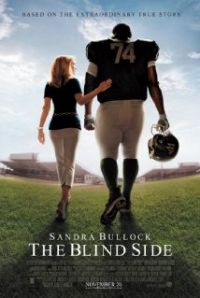A guest post by Monique Bucheger.

Knowing the difference between touchdowns and home runs is pretty much where my experience with organized sports begins and ends. So I wondered why “The Blind Side” -a movie that revolves around football-popped into my mind when I was asked to write a guest post about “Lessons Learned from the Big Screen.” Then I realized that what appealed to me most about this movie had nothing to do with sports, but everything to do with character.
Not so much characters, as in the people in the movie–but rather character, as in how a person behaves and reacts to situations because of their life experiences, as well as their own personal goals and standards.
You won’t find spectacular, high budget special effects in The Blind Side. It doesn’t even have a particularly unique storyline. What it does embrace is the magic of what happens when ordinary people behave in extraordinary ways.
“The Blind Side,” is a semi-biographical story of Michael “Big Mike” Oher, a defensive linebacker for the Baltimore Ravens, as well as the Tuohy family: a dad (Sean), a mom (Leigh Ann-played by Sandra Bullock), a teenage daughter (Collins), and an elementary age son (SJ).
Big Mike, a homeless, kind-hearted, black teenager from the projects, is spotted in freezing weather wearing only a short-sleeved shirt and shorts by the Tuohys, a well-to-do, white family. The Tuohys invite him to spend the night. Before long, the entire Tuohy family welcomes Big Mike into their hearts, as well as their home.
What resonated most with me is that the Tuohy family treats Big Mike with dignity and respect-not as a charity case or a project to save. For his part, Big Mike embraces the Tuohys’ kindness, and protects them to the best of his ability.
In one scene, Big Mike and SJ are driving in Big Mike’s new truck and get in an accident. Big Mike literally punches the air bag so hard that he filets the first layer of skin off his arm to save SJ from harm. In another scene, Big Mike -who seldom voices an opinion, let alone an objection-insists Leigh Ann stay in her locked car. He knows her presence as a white woman will not go over well in the ghetto neighborhood where he grew up. Leigh Ann, who refuses to be intimidated by anything or anybody, reluctantly honors his request and builds his trust.
The Tuohys are huge football fans and Big Mike is built like a refrigerator. The pairing seems like a match made in heaven. Unfortunately, Big Mike knows very little about the game, and would rather focus on being accepted as a member of the family than the football team. His coach grumbles: “He looks like Tarzan, but he plays like Jane.”
While watching an uncomfortable football practice where Big Mike fails repeatedly, Leigh Ann soon realizes that Big Mike’s guileless, protective nature is both his biggest weakness and his greatest strength. He genuinely doesn’t want to hurt anybody, and does not possess the fire and drive to be a star athlete.
Once Leigh Ann points out to Big Mike, that the players on the team are to be thought of as the extended Tuohy family, Big Mike changes his penchant for peace and powerhouses through anyone trying to stop or harm those he has been charged with defending. This makes for some fun scenes. Leigh Ann’s desire to figure out what makes Big Mike tick-so that she can help him succeed-parallels well to an author writing a compelling, rounded character.
When an author knows what truly motivates their characters, marvelous and memorable things can happen-even while catapulting them out of their comfort zone and into unexpected … and often scary circumstances.
Throughout the movie, there are many touching scenes-Big Mike wants a driver’s license so he can have his name on something important. “Oher” apparently isn’t his real last name and no one, not even his caseworkers, knows what it is. Leigh Ann connects with Michael’s drug-addicted birth mom to find out, treating her kindly, in spite of the woman’s inability to protect Big Mike from the many horrors that permeated his childhood.
Movies such as “The Blind Side” remind viewers that regular people-you and me-can and should become a hero in their own lives and those they care about.
These kinds of movies show us that life isn’t a “do-it-yourself’ project, but rather an opportunity to stretch and grow and become the best we can be. Even better is when we bring others along on the journey.
Reading over this post, I realize I was wrong about one thing: the “awesomeness” of the movie isn’t about living a principled life as much as it is about characters living their day-to-day lives with great character. There is a powerful lesson in that.
In real life, as well as in books and movies, it is rewarding to spend time with people who strive to make a big difference in their own little corner of the world.
* * *
Monique Bucheger lives in Colorado. When she isn’t writing, you can find her playing taxicab driver to one or more of her 12 children, plotting her next novel, or multi-tasking with her husband of 28 years. Even though she realizes there will never be enough hours in any given day, Monique tries very hard to enjoy the journey that is her life. She is the author of three published books and several unpublished ones. You can find more about Monique and her works at: www.moniquebucheger.blogspot.com
